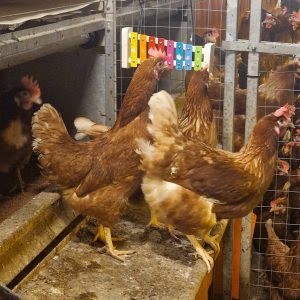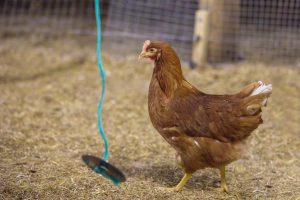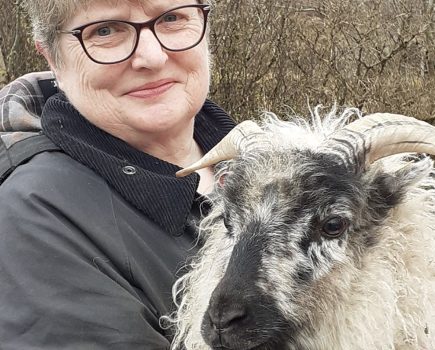A new poll reveals that nine out of ten people think the welfare of hens is important especially whilst they’re being housed indoors due to bird flu.
The survey, carried out by RSPCA Assured – the RSPCA’s ethical food label and farm assurance scheme – also revealed that on average Brits eat around 3-4 eggs per week and with Pancake Day upon us, this number is expected to rise.
The UK has faced one of the worst outbreaks of avian influenza (AI) over the last year which has sadly seen birds becoming ill and dying; a nationwide housing order being imposed meaning free-range eggs are now labelled as ‘barn’; and egg shortages on supermarket shelves leading to imported eggs from potentially lower welfare farms.
The public have been understandably concerned about the impact this has had on hens, with a whopping 87% saying hen welfare is important to them and that they believe they should be provided with enrichment (such as perches, items to peck at and areas to dustbathe) whilst housed indoors – with only 6% of people saying it isn’t important.

An RSPCA Assured laying hen farm in Lincolnshire has come up with a novel way to enrich their birds’ environment by providing xylophones to peck at
Kate Quilton, food campaigner and broadcaster, said: “Like many people, I’m concerned about the impact bringing birds indoors has on their welfare which is why it’s reassuring to know that whether barn or free-range, all hens on RSPCA Assured farms are still cared for to higher welfare standards.
“With Pancake Day upon us, I want to help remind people that it’s very easy to make a big difference to the welfare of hens by only choosing eggs with a higher welfare label such as RSPCA Assured.”
Further, the survey revealed that three-fifths of adults do not eat eggs that have come from caged hens (58%), which rises to 64% among women. Shockingly, in the UK around 15 million hens (35%) are still kept in cages which restrict their ability to move around and exhibit their natural behaviours – with little more usable space than the size of a large pancake (around 31 cm).
Kate Norman, RSPCA laying hen expert, said: “Bird flu has meant that it’s been a particularly challenging year for egg farmers and laying hens. All poultry had to be brought inside to try and stop the spread of bird flu which can be very stressful for free-range and organic birds who would otherwise be roaming free. It’s heartening to see that this is an issue that resonates with the public and that so many people want to see hens being well looked after with plenty of enrichment whilst housed indoors.
“Chickens are inquisitive and social animals that need vital enrichment so they can express their natural behaviours and be happy and healthy. This is why whether they are free-range or barn, all RSPCA Assured laying hens are cared for to higher welfare standards. Not only are RSPCA Assured farms 100% cage-free but the birds are also provided with raised perches and plenty of enrichment.”
An RSPCA Assured laying hen farm in Lincolnshire has come up with a novel way to enrich their birds’ environment by providing xylophones to peck at and play on.
RSPCA Assured assessor Caren Darby said: “When you enter the hen house, it’s like a Night at the Proms. All you can hear are the jingles the hens are creating. It’s a sound and sight to behold! Although it might seem like a whimsical thing to give to hens, it’s actually a beneficial form of enrichment as the noise they make will likely increase the time the hens interact with them.”
Recycling old CDs is another novel way to provide enrichment for hens. By tying them to string this means they move when they are pecked at and the light reflected from the CDs adds to the hens’ interest. Some RSPCA Assured farms even provide footballs for their birds. They enjoy moving them around and balancing on top of them. Hens have even been known to play with traffic cones and rocking horses!

Recycling old CDs is another novel way to provide enrichment for hens
The poll also found that Aldi and Waitrose shoppers care the most about hen welfare and enrichment with 92% of shoppers saying it was important to them.
Kate added: “Across the UK, as people start preparing to whisk up some pancake batter and deciding what toppings to have, we would urge them to consider buying RSPCA Assured eggs to ensure the hens have had a higher welfare life. It’s so simple to make a big difference to the welfare of farm animals by buying products with the RSPCA Assured label.”
RSPCA Assured has released a new TV ad to mark Pancake Day. Watch it here: https://www.youtube.com/watch?v=r9mErVV6YqU
RSPCA Assured eggs are always higher welfare – whether the hens are free-range or barn. For a kinder Pancake Day, look for the label.
More news like this can be found in The Country Smallholder magazine. Subscribe here.
For regular updates from the world of smallholding, sign up for The Country Smallholder newsletter here.








